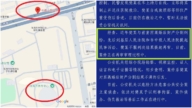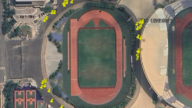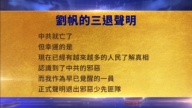【新唐人2013年11月25日訊】最近,大陸不動產統一登記制度成了各方議論的焦點,有專家分析,不動產統一登記制度一旦實施將會有效抑制房價;另有外媒認為,中共貪官會因不動產統一登記而驚慌恐懼;中共官媒則聲稱,制度出臺將有利於徵稅和反腐。但人們坦言:對政府出臺的任何所謂「良策」都已不抱期望。
據大陸官媒報導,中共當局在11月20號召開的國務院常務會議上宣佈,將整合不動產登記職責,建立不動產統一登記制度。這項制度包括,由住建部、國土部、農業部、林業部、漁業、海洋部,分別將負責登記的土地、房屋、草原、林地、海域等不動產,全面劃歸「國土資源部」統一登記﹔建立所謂「不動產登記信息公開查詢系統」,實現不動產審批、交易和登記信息在有關部門間互通共享等。新規很快引發了輿論討論,並出現了「媒體熱捧,民間遇冷」的局面。
儘管官媒和某些專家一再宣傳不動產登記政策好處多多,不但可以調控房價,又能成為反腐利器,還有助於未來房地產稅、遺產稅的全面徵收等,但網民的反應卻狠狠的潑了當局一頭冷水。民眾認為,中共空談誤國、作秀、雷聲大雨點小、騙人的把戲等。
大部分的觀點認為,新政在權貴既得利益集團阻撓下,或是不了了之,百姓空歡喜一場,或是用一個拖字訣,給貪官們足夠的時間把財產「漂白」,或是採取各種規避對策,但絕不可能對自己下手。
美國南卡羅萊納大學艾肯商學院教授謝田:「我們也知道,中共官員向來上有政策,下有對策,可以有至高無上的權力,高於法律的權力,同時總是有辦法作些手腳,想辦法來欺騙、來蒙哄過關。所以如果中共專制的問題不解決的話,這個東西是肯定根本上沒辦法真正實行下去的。」
其實早在2007年《物權法》出臺時就明確提出了不動產實行統一登記制度,但六年過去,這一政策由於實際推進中受到多個部門和利益集團的重重阻撓,加上地方政府的不配合,使得這項工作不得不中途夭折。
謝田:「我覺得這個(政策)基本上可以確定中共不敢做,也做不到的,中共官員現在是無官不貪,就是所有人都貪。一旦公布的話,大量官員這些罪行曝光的話,可能馬上就動搖中共的統治。」
北京《環球時報》轉述義大利ilterziario網站文章——《中國的全國不動產登記制度將嚇壞貪官》。文中指出,大陸許多貪腐現象,都與價格過高且藏污納垢的房地產市場密切相關,但由於舊不動產登記系統的各自為政,使得當局對非法持有多套房產的官員束手無策。
文章認為,新不動產登記體制的實施,將會令通過房地產圈錢和「洗錢」的中共貪官們無處遁形,驚慌失措。而網民們卻指出,外媒太低估了中共製度的漏洞了,這些將權術玩到極致的中共貪官們,不但不會被「嚇壞」,反而有可能鑽新規漏洞,為自身牟利。
謝田:「像任何正常社會的很多很多事情一樣,一旦中共開始實施的話,它就變了形,走了樣了,所謂『實施』的話呢,我們也可以想像到,它不會達到正宗的目地。」
一些民眾則認為,不動產登記制度的本身,就是為了全面開徵房地產稅而制定的,目地還是為了盤剝百姓。
謝田:「如果稅率很高的話,實際上對老百姓,即使他擁有一套房子的話,也會造成很大的衝擊。那些沒有擁有房子的老百姓,假如租房子在住,房東一定會把稅這部分成本轉嫁到租金上面,0644這對他們可能也是一個很大的或者難以承擔的負擔。」
據報導,不動產政策雖然已經明確,但具體落地仍需時日,不動產統一登記工作的具體時間表問題,目前也還沒有準確消息,網民諷刺,希望有生之年能夠看到政策實施。
採訪編輯/張天宇 後製/葛雷
Could Unified Real Estate Registration Become A Nightmare?
China has recently created a
unified real estate registration system.
Analysts believe that this policy
will effectively curb property prices.
International media suggest this system
will make corrupt officials cautious.
Chinese state-controlled media report that the
registry will lead to tax levies, and fight corruption.
There are others who say that they don’t hold
out much hope towards the regimes policy.
State-controlled media reported on a unified real
estate registration system that was decided at an
executive meeting of the State Council on November 20.
Property, such as land, housing, grasslands,
woodlands, and water bodies, were formerly
under various government agencies.
These agencies included Housing, Land,
Agriculture, Forestry, Fisheries, and Oceans.
Property will now be registered and supervised
by the Ministry of Land and Resources.
There will be a public inquiry system, in which
real estate approval, transactions and registration
information can be shared by different agencies.
Following the release of this news,
there has been a lot of discussion.
Opposing opinions could be seen in a comparison
between Chinese state media and internet users.
State media and some experts praised the plan.
It was said that it will control market prices,
fight corruption, and lead to future tax levies.
Internet users had a different voice.
They criticized the Communist regime, feeling
that it is just more empty talk to decieve people.
They said that the new leadership will do nothing in the end,
due to opposition from powerful groups with vested interests.
People will get nothing out of the new policy, but corrupt
officials will have plenty of time to escape from the policy.
Xie Tian, professor of School of Business, University
of South Carolina Aiken: “We have known that the
regime’s officials are capable of dealing with any policy.
This is because of their power that is
above the law, and their deceptive tactics.
Without resolving the problem of dictatorship,
there can be no way to implement any policy."
Property Law became effective in 2007.
It clearly stated a unified registration system for property.
This has never been implemented during the past six years.
There is resistance and rejection from various agencies,
groups with vested interests, and local governments.
Xie Tian: “I think this policy basically confirms that
the Communist regime dare not and cannot do it.
Almost every Communist official is corrupt.
The public exposure of the officials’
property will expose their crimes.
It could immediately shake the
ruling of the Communist regime."
State-controlled media ‘Global Times’, quoted an
article from Italy’s ‘Il Terziario’, entitled “China’s National
Property Registration to Spook Corrupt Officials."
The article argued that the Communist regime has
lost its control in overpriced and murky real estate.
The fragmented registration agencies face
strong resistance from government officials.
The article stated that the new policy is expected
to create great consternation among corrupt officials.
However, internet users indicate that the foreign media
has underestimated the loopholes in the Communist system.
Corrupt officials are very skillful.
They will not be frightened, and they will find
new loopholes to be able to collect their wealth.
」
Xie Tian: “Many things that seem ordinary in a normal
society will get distorted in the Communist regime.
It’s foreseeable that the implementation
of this policy will not reach its actual goal."
Some people suspect the real estate registration system
is to develop a comprehensive real estate tax levy.
The end purpose is to exploit the people.
Xie Tian: “If the tax rates are high, it will have a big impact,
even upon ordinary people who have just one house.
Those who do not own a house will pay higher
rent, transferred to them by their landlords rates.
In this case, it is also a burden."
According to reports, the effective date
for the policy is yet to be determined.
There is also lack of clarity about
the timetable for unified registration.
A satirical comment from an internet user says that they
hope the policy will be implemented while they are still alive.
Interview & Edit/ZhangTianyu Post-Production/GeLei




























